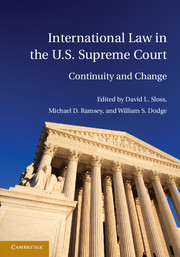Book contents
- Frontmatter
- Contents
- List of Contributors
- Table of Cases
- Acknowledgments
- Introduction
- PART I FROM THE FOUNDING TO THE CIVIL WAR
- PART II FROM THE CIVIL WAR TO THE TURN OF THE CENTURY
- PART III FROM THE TURN OF THE CENTURY TO WORLD WAR II
- PART IV FROM WORLD WAR II TO THE NEW MILLENNIUM
- PART V INTERNATIONAL LAW IN THE U.S. SUPREME COURT IN THE TWENTY-FIRST CENTURY
- V.A TREATIES AFTER 2000
- V.B CUSTOMARY INTERNATIONAL LAW AFTER 2000
- V.C INTERNATIONAL LAW AND CONSTITUTIONAL INTERPRETATION AFTER 2000
- Main Essay – International Law and Constitutional Interpretation in the Twenty-First Century: Change and Continuity
- Response – Essay Why Constitutional Comparativism Is Different: A Response to Professor Tushnet
- Response Essay – Judicial Dialogue in Roper: Signaling the Courts Emergence as a Transnational Legal Actor?
- V.D INTERNATIONAL LAW AND STATUTORY INTERPRETATION AFTER 2000
- V.E INTERNATIONAL LAW AND THE WAR ON TERROR
- VI CONCLUSION
- Index
- References
Response – Essay Why Constitutional Comparativism Is Different: A Response to Professor Tushnet
Published online by Cambridge University Press: 05 July 2011
- Frontmatter
- Contents
- List of Contributors
- Table of Cases
- Acknowledgments
- Introduction
- PART I FROM THE FOUNDING TO THE CIVIL WAR
- PART II FROM THE CIVIL WAR TO THE TURN OF THE CENTURY
- PART III FROM THE TURN OF THE CENTURY TO WORLD WAR II
- PART IV FROM WORLD WAR II TO THE NEW MILLENNIUM
- PART V INTERNATIONAL LAW IN THE U.S. SUPREME COURT IN THE TWENTY-FIRST CENTURY
- V.A TREATIES AFTER 2000
- V.B CUSTOMARY INTERNATIONAL LAW AFTER 2000
- V.C INTERNATIONAL LAW AND CONSTITUTIONAL INTERPRETATION AFTER 2000
- Main Essay – International Law and Constitutional Interpretation in the Twenty-First Century: Change and Continuity
- Response – Essay Why Constitutional Comparativism Is Different: A Response to Professor Tushnet
- Response Essay – Judicial Dialogue in Roper: Signaling the Courts Emergence as a Transnational Legal Actor?
- V.D INTERNATIONAL LAW AND STATUTORY INTERPRETATION AFTER 2000
- V.E INTERNATIONAL LAW AND THE WAR ON TERROR
- VI CONCLUSION
- Index
- References
Summary
Professor Mark Tushnet is one of this country's leading scholars of comparative constitutional law, and his short essay reflects the traditional internationalist position in favor of constitutional comparativism. He defends Lawrence v. Texas and Roper v. Simmons as unremarkable cases consistent with a long line of Supreme Court precedent. The only thing remarkable about these cases, Professor Tushnet argues, is the tempest in a teapot they have generated.
I offer here a few brief reflections on where I disagree with Professor Tushnet, focusing on two key issues: (1) why the problem of selective use of comparative material is so intractable and (2) why the case for constitutional exceptionalism is not based on a belief in American superiority. Given space limitations, I do not address other areas of disagreement. For example, I do not address Professor Tushnet's claim that scholarly criticism of constitutional comparativism is motivated by an originalist agenda. As I have written elsewhere, the most thoughtful critics of constitutional comparativism are not movement conservatives, but respected scholars who present cogent concerns that have nothing to do with originalism.
The Selectivity Problem
One of the most common criticisms of constitutional comparativism is that it is used selectively, both in terms of when it is used and in terms of what is borrowed from abroad. Professor Tushnet recognizes that selective use of comparative material is a legitimate concern, but fails to appreciate the full extent of the problem.
- Type
- Chapter
- Information
- International Law in the U.S. Supreme Court , pp. 518 - 522Publisher: Cambridge University PressPrint publication year: 2011
References
- 1
- Cited by



